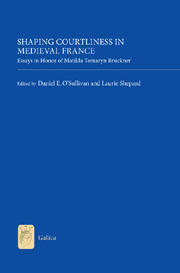Book contents
- Frontmatter
- Contents
- List of Illustrations
- Acknowledgements
- Introduction
- Matilda Tomaryn Bruckner: A Bibliography
- Part I Shaping Real and Fictive Courts
- Part II Shaping Courtly Narrative
- Part III Shaping Women's Voices in Medieval France
- Part IV Shaping the Courtly Other
- Envoi
- List of Contributors
- Index
- Tabula Gratulatoria
- Already Published
Introduction
Published online by Cambridge University Press: 05 May 2013
- Frontmatter
- Contents
- List of Illustrations
- Acknowledgements
- Introduction
- Matilda Tomaryn Bruckner: A Bibliography
- Part I Shaping Real and Fictive Courts
- Part II Shaping Courtly Narrative
- Part III Shaping Women's Voices in Medieval France
- Part IV Shaping the Courtly Other
- Envoi
- List of Contributors
- Index
- Tabula Gratulatoria
- Already Published
Summary
The term “courtliness,” derived from Latin curialitas and curia meaning “senate” or “meeting,” pervades discussions of medieval literature, so much so that scholars may take it for granted. Against the medieval social landscape of daily violence, courtliness denotes a civilizing concept whereby behavior in a potentially explosive center of political and social ambition – the court – becomes ritualized. Courtliness aimed to sublimate a warrior's violent impulses and channel them in both speech and deed to a series of socially sanctioned behaviors. When one knight believed himself to possess superior martial skill, proving it at a tournament was preferred to mortal combat on the battlefield. Or when a knight sought the favors of a beautiful lady, before turning to kidnap and rape he could woo her with clever and seductive words. However, if Freud correctly intuited in Civilization and its Discontents that humans harbor an inherent proclivity towards violence and that civilization constitutes a trade-off of one's immediate gratification of desire for bodily and psychological security, courtliness is not a universal psychological condition, but a social response grounded in history. Civilizing efforts predate the Middle Ages: courtliness was one effort that can be identified with a period of history – the so-called Middle Ages – and studied over time.
- Type
- Chapter
- Information
- Shaping Courtliness in Medieval FranceEssays in Honor of Matilda Tomaryn Bruckner, pp. 1 - 14Publisher: Boydell & BrewerPrint publication year: 2013



